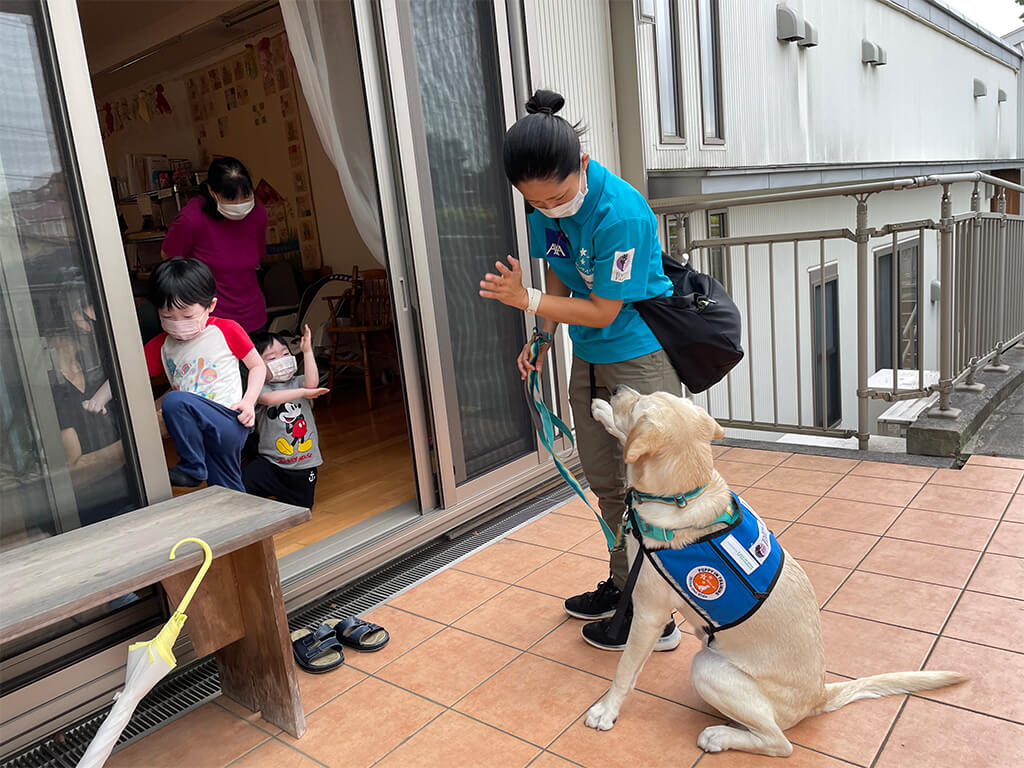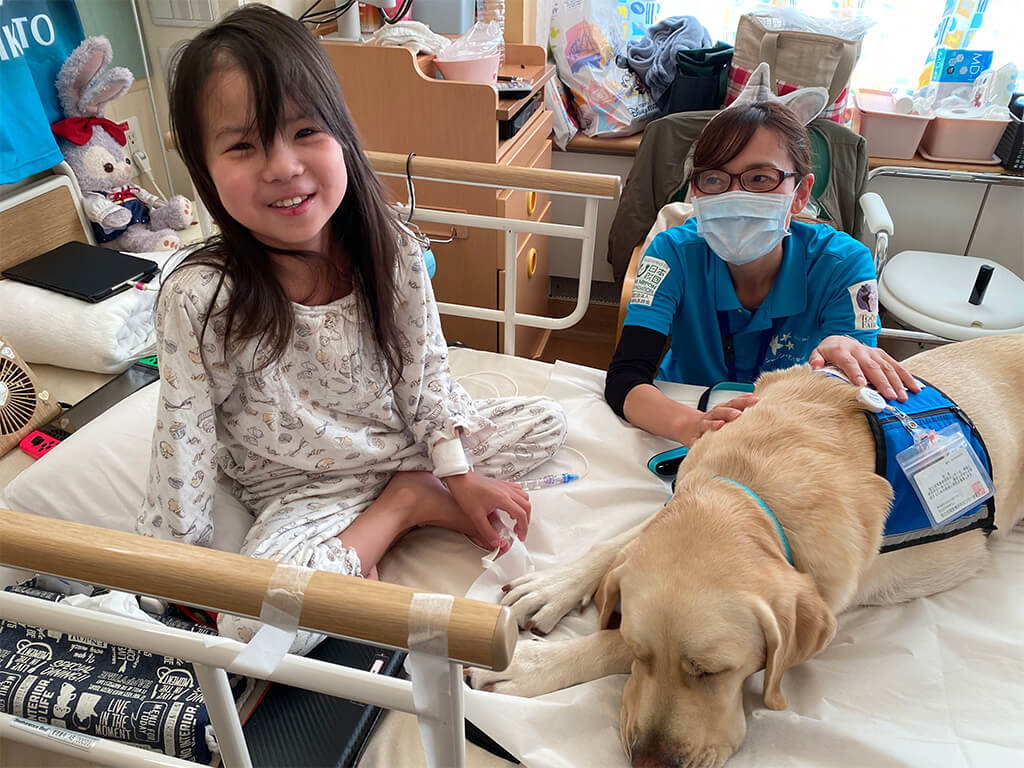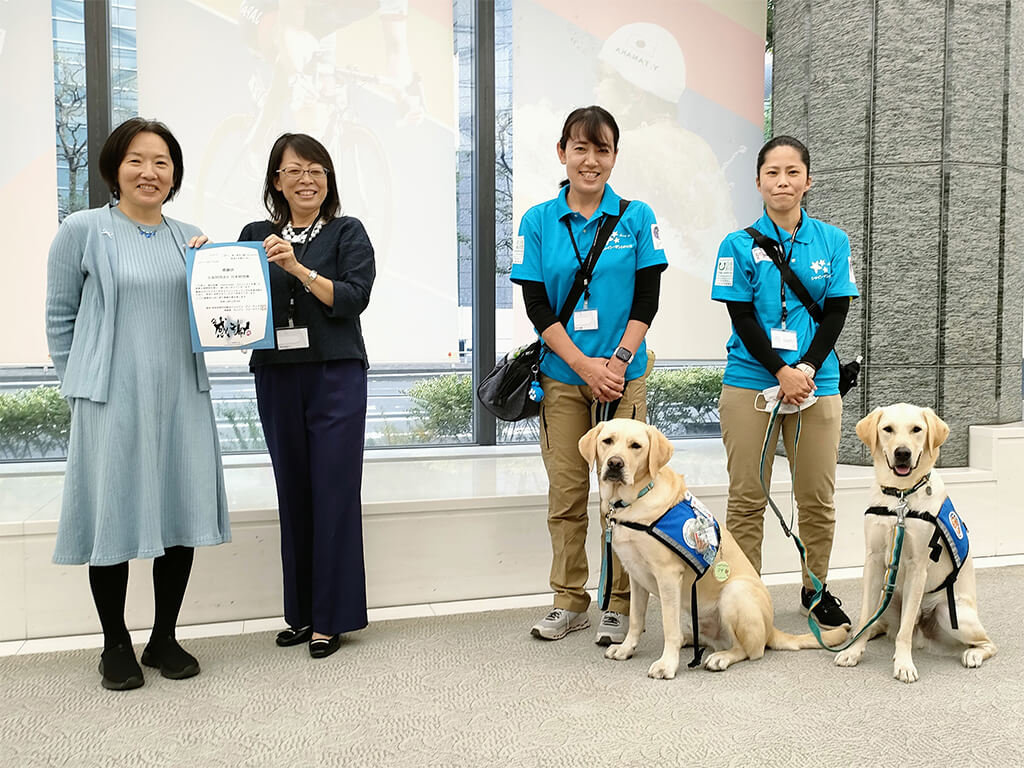Facility Dogs Visiting Children’s Hospitals Across JapanProgram operated by Shine On! Kids for hospitalized children
Providing emotional support to children with serious illnesses
Facility dogs are service dogs specifically trained to be close to children hospitalized with serious illnesses. They are part of the hospital staff and provide emotional support to children and their families. The dogs accompany children when doing things like going to the operating room or when having blood samples taken, and their presence helps to relieve the children’s stress, approach their treatment with a positive attitude, and promote a healthy appetite and rehabilitation.
Facility dog Masa began working at the National Center for Child Health and Development in Tokyo in 2021. When Masa visited the center for the first time while still in training, someone from the nurses station said that a child had just stood up, and many doctors and nurses gathered around and cheered. A boy who had been lying in his bed had stood up to get a glimpse of Masa walking down the hallway. The boy had become unable to walk because of his treatment and had not been responding to the staff’s rehabilitation efforts. Program manager Natsuko Murata recalls that it was a very impressive moment that demonstrated the possibilities and power that facility dogs possess, saying that dogs can provide strength in ways that people cannot.
The Hospital Facility Dog Program is operated by the NGO Shine On! Kids (“SOK”), which carries out a variety of activities to support children with cancer and other serious illnesses and their families. The program began in 2010 with the introduction of the first facility dog, Bailey, at Shizuoka Children’s Hospital. Since 2015, the program has received support from The Nippon Foundation’s Tooth Fairy Project, which works with the Japan Dental Association to raise funds to support children by recycling gold, palladium, and other metals used in dentures and dental treatment. Four facility dogs are currently working at four children’s hospitals in Japan (one facility dog and handler are assigned full time to one hospital), and one more is currently undergoing training in Japan.

Creating a framework for community support
Masa began working at the National Center for Child Health and Development in 2021 and has interacted with more than 2,600 children. Over time, Masa has become able to visit more wards and even accompany children to operating rooms. The dogs were originally trained in Hawaii before being brought to Japan, but training in Japan began on a trial basis in 2019. During fiscal 2022, facility dogs visited 6,366 children, and the program is working to double the number of visits over the next five years.
Soon after Nick, a facility dog candidate supported by the Tooth Fairy Program in fiscal 2022, began training, however, the program felt the effect of the coronavirus pandemic. At the peak of the pandemic, the hospital at which Nick was scheduled to undergo on-the-job training had to restrict visits from outside, so as a solution, a residential facility for families of seriously ill children undergoing treatment at a nearby children’s hospital agreed to accept Nick. Facility dogs also visit the homes of children they have visited in hospitals, and the children’s siblings enjoy interacting with them as well.
Ms. Murata explains that their goal is to have the dogs work in large hospitals, but visiting residential facilities for families and children’s hospices also gives the dogs valuable experience. The people at the facilities enjoy having the dogs visit, and SOK is grateful for the new ties these visits create. SOK would also like to maintain ties with families of children whom facility dogs have visited and to train facility dogs together, to create a framework in which communities support children with cancer. By creating interest closer to home, they hope to build local support in cooperation with local governments.

Pandemic makes the program even more necessary
Yuko Morita, handler of the facility dog at the Kanagawa Children’s Medical Center, says that the coronavirus pandemic makes care for children even that much more necessary, and hopes the visits can continue. The dogs have built relationships of trust with the children and provide the children with important, irreplaceable emotional support.
Ms. Murata researched guide dogs for her doctoral dissertation and is an animal welfare specialist. She says she wanted to have a job that involved making animals happy, and that she dove into this world thinking the way the animals shine is wonderful, and that nothing makes her happier than seeing the soft, happy expressions on the faces of the children and their families. The dogs’ welfare is looked after as well; on days they are not working they are taken to parks, the ocean, or the mountains where they can play as dogs to their heart’s content.

Continuing to bring smiles to children and their families
Ms. Murata explains that her first goal is to make more people aware of facility dogs and have them talk about facility dogs. This is what gives her and her staff strength and encouragement. Facility dogs are not covered under the national health insurance compensation system, so most of the costs are covered by donations. SOK is working to make more people aware of the program, with the hope of doubling the number of visits in five years. The long-term dream is to have a facility dog assigned to 38 children’s hospitals across Japan, and eventually to build a national movement so that they are a common site in all hospitals that have pediatric patients.

Related Links
Contact
Public Relations Team
The Nippon Foundation
- Email: cc@ps.nippon-foundation.or.jp



